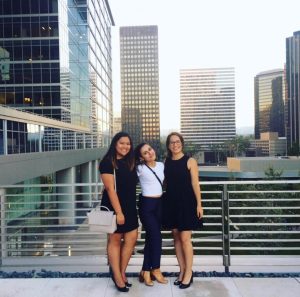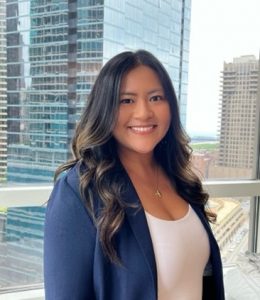During my junior year of undergrad, I was ecstatic when I received an offer to join the Legal Department of Fox Entertainment Group (now, 20th Century Studios) as a Content Protection Intern. The idea of working on a major studio lot was more than exciting to someone who had grown up an hour away from Hollywood.
While at the time I wasn’t too sure what type of law I wanted to pursue, interning in the Legal Department of a major company such as Fox seemed like a perfect way to learn about different areas of law, eventually leading me to what I hope to practice as an attorney – Intellectual Property.
My Experience at Fox
Prior to starting at Fox, I was initially worried about one single question: What even was “Content Protection” and how did it relate to movies and television? I was overwhelmed by the opportunity to work in-house at such a great company, with no previous legal knowledge or understanding of what my title entailed.
I was quickly relieved to learn that to succeed at my internship at Fox, I didn’t need to understand what content protection was. Instead, the internship was structured to help me learn.
I was introduced to so many creators – from producers to writers – who created content for Fox. I learned that their content wasn’t just movies and television shows. It was actually their stories, ideas, and voices. Every creator I met seemed to use the movies and television shows they helped create as a platform to advance social change through storytelling. It was truly inspiring!

Photo with my fellow Fox legal interns, taken from my Instagram account.
Content Protection is Protecting IP
Eventually, I learned that Fox obtained copyrights for each of the movies and television shows that these creators helped to make. Copyrights are a type of IP that provides protection to a work that is original to a creator and has a minimal level of creativity. Because each of these creators worked for Fox as employees, Fox was allowed to obtain copyrights for their works.
Once these movies and television shows were released, it was my job as a Content Protection Intern to help protect those works from copyright infringement. I assisted the Legal Department by performing research to find where and how their movies and television shows were being illegally copied or streamed. Then, I analyzed this data and presented my findings to Fox business executives and attorneys so they could prevent any further infringement.
I quickly learned that content protection is challenging because it isn’t just one single thing. As consumers, we change our behavior all the time as new platforms through which we consume content emerge (think Instagram, TikTok, BeReal). Helping to protect the copyrighted content of a large company (which has a lot of content) across an ever-changing media landscape means that working in content protection is dynamic and can change almost daily.
Working in IP Means Helping Others
Overall, I learned that my work in the legal department at Fox Entertainment Group wasn’t just legal work, and it didn’t entail just protecting the copyrighted content of a large company.
While Fox owned the copyrights to each of these works, the resources of a large company like Fox helps to ensure that creators can keep creating. My work helped to support a company that in turn supported people who wanted to make a meaningful difference through storytelling.
As an aspiring attorney, my internship at Fox helped me to realize that I wanted to work in IP because I enjoy helping others protect and advance their creative ideas. These ideas have the opportunity to impact the lives of so many people, and it is so great to play a role in that process.
IP at Loyola
After realizing that I wanted to pursue IP law after my internship at Fox, I chose to attend Loyola because of the strength of its IP program.
During my 1L year, I had the opportunity to take a specialized 1L IP Legal Writing course. In this two-semester course, I built upon my knowledge of copyrights and learned about other types of IP. For example, I learned about trademarks, which include a company’s words or logos if they identify the source of the company’s goods or services. I was also exposed to patents, which grant inventors rights for a process, machine, manufacture, or composition of matter if it is new and useful. And currently, during my fall semester of 2L, I am taking the IP Survey class with Professor Cynthia Ho. The IP Survey class has reinforced what I learned during my time at Fox, and I have enjoyed learning more about what types of works are copyrightable and how companies like Fox can obtain copyrights for the works that their employees create.
Ultimately, it is exciting to now be a 2L interested in IP because Loyola gives students the opportunity to be involved in IP beyond the classroom. In addition to IP Bytes, I am also a Peer Mentor for the IP Law Society and a member of Loyola’s Saul Lefkowitz Moot Court Competition Team. On the Moot Court team, I am writing a trademark-related brief that I will later argue before a panel of judges. While I never would have known my time as a Content Protection Intern at Fox would lead me to IP at Loyola, it has been such a great journey and I can’t wait to continue being involved in IP over my next three semesters!

Kristen Salas Mationg
Assistant Blogger
Loyola University Chicago School of Law, J.D. 2024
